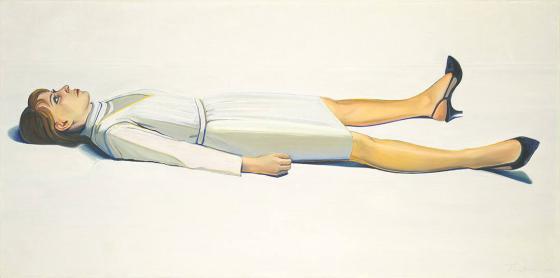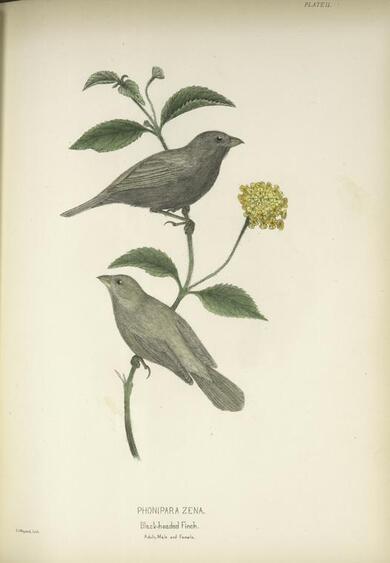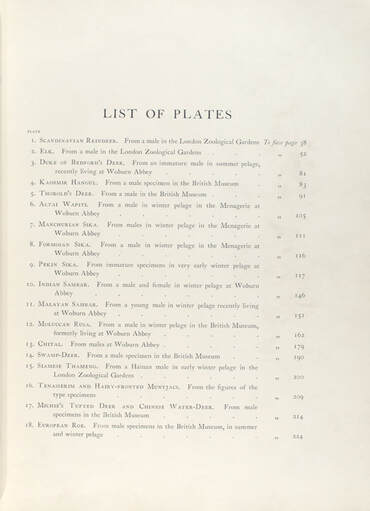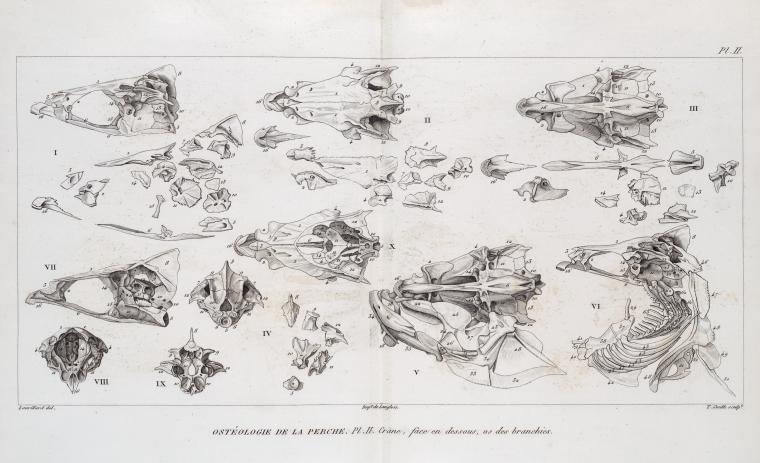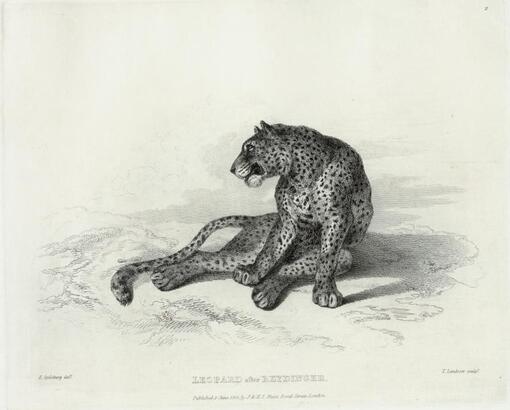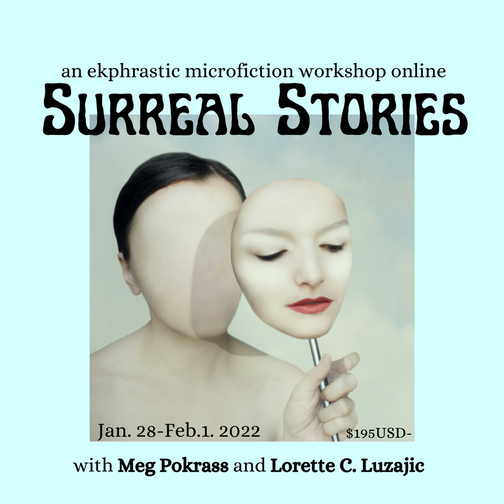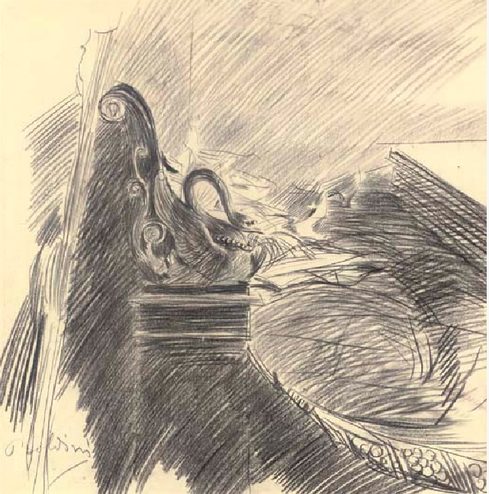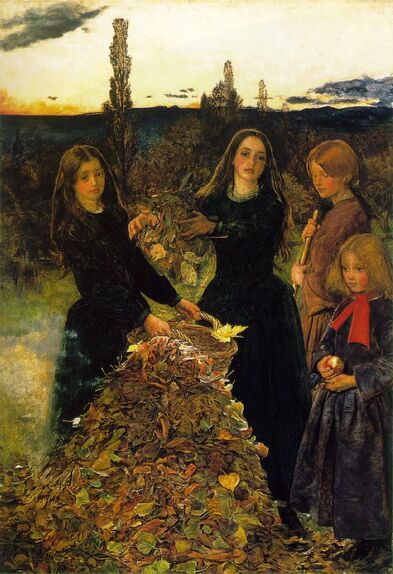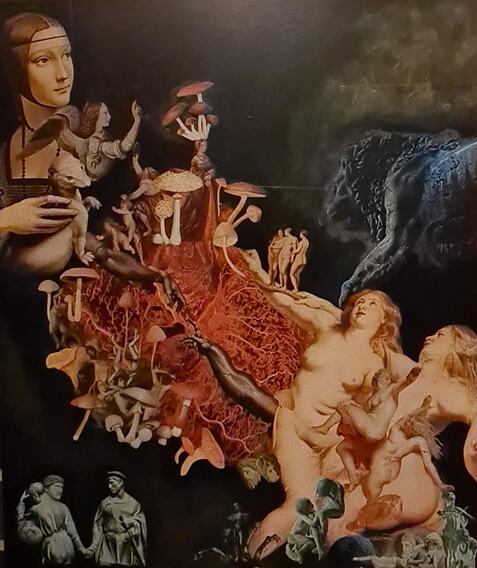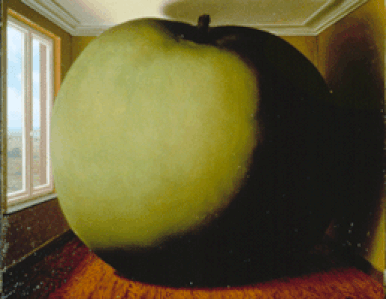|
To Your Pain and My Declining Ability to See She presented you with her hair scrunchie a week ago to wear on your wrist in public, at school, when you’re with the guys at the pool, or lingering in the parking lot just before soccer practice. It changed your gait, this bluish-gray, silky iridescence, billowy on your slim wrist—an awkward corsage, a colour full of morning fog and promise. My students tell me this is a thing now. Like a ring, they keep saying. But today you are sprawled on your bed, diagonal, away from us. I think of Thiebaud’s Supine Woman. She’s flat on her back on white, lots of white. Tired of being her. Close up, the lines are thick, so straight-ish, she can’t move a tick—maybe she doesn’t want to move—her eyes held straight up—the lines thinner around her thighs, her shape, her white dress, barely visible, separate from all the space, all the tenable white. But we know that these lines, any lines, tell us nothing but that they are there. Yes, you’re her opposite, in form, too, your head stuffed down deep into the bed, on top of the blanket your mom laid there to warm you this past fall—the same scrunchie color now not on your wrist, not anywhere I can see. When you turn over, your tears are resting in the corner of your eyes, thick and obvious— like his paint, like those lines-- but only to the one who chooses to stand close enough to begin to see, especially to the one who chooses to attend to the lines, on this bed, usually so thin. Jacob Stratman Jacob Stratman’s first collection of poems, What I Have I Offer With Two Hands, was released in 2019 through the Poiema Poetry Series (Cascade Books). He teaches in the English department at John Brown University in Siloam Springs, Arkansas.
0 Comments
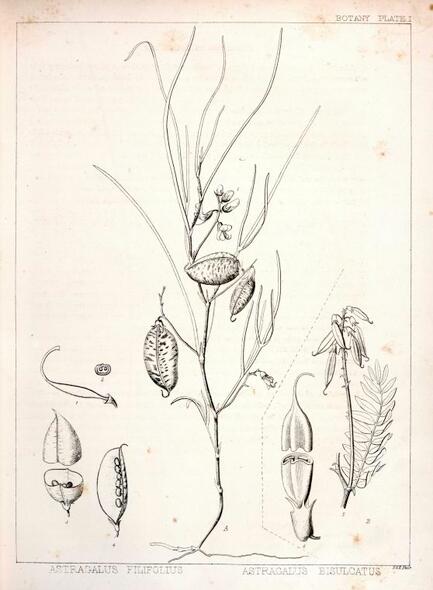 General Research Division, The New York Public Library. (1860). A. Astragalus filifolius, 1. Pistil enlarged, 2. Cross section of the ovary enlarged, 3. Legume transversaly divided, 4. Same longitudinally divided; B. Astragalus bisulcatus, 5. Fruit with a leaf, etc., 6. Fruit, with the calyx, etc., transversely divided, enlarged to thrice the natural size. Retrieved from https://digitalcollections.nypl.org/items/510d47d9-5384-a3d9-e040-e00a18064a99 Pistil 1. My heart took root. Legs underwater. Legs in the sink. Legs in the garden. Legs all the way basement down. 2. I was born inside a peach pit. You bit the stone. Juice dripped down your chin. 3. When they cut my soul in half to look for worms they found stray pink yarn. 4. When they cut my brain in half to look for worms they found silk ones spinning legacies. 5. The baby with a leaf growing out of her-his head. 6. I shattered the crib with all my futuring. Soon to be soon to be soon to be. Phonipara Zena The sun was an orange USB drive that held every photograph from when we were children: sandbox, slate, pocket knife, bond fire, bone. We stood back to back then walked the length of our branches. Yellow catastrophe. Yellow song. All the old music from when we could easily download the world. What did I know about waiting? We were finches. Flower necks could hold us. List of Plates
Ostèologie de la perche Together we traced Pangea beneath your face. Filled in what lapses the ocean would take dominion over. Sometimes I want to be a 24/7 submissive. Want to empty myself of everything but service. Who out there would like to use my bones? With a paring knife, I slip one out and place it beneath my mother’s bed. Baby teeth are recycled. Your mother’s baby teeth are your baby teeth and so on and so on. Once I lied to my mother and said the “mother” in my poems is not her but the idea of a mother. What is the distance between the idea of something and the real walking body? Charting the continents, the shorelines change. Sometimes I have ribs and sometimes my chest is just wide open. A skull within a skull. “No more drifting. There’s not enough time. We need to race,” says the tectonic plates. An earthquake names itself after your birthstone. Leopard I wanted to take back my detail. Peel the outline like a rind and walk unblotted and staining. Wearing all white in the middle of a field. All I can see is eyes. Running as fast as a car until my knees become bullets. Bullet proof glass. Resting peacefully in the stippling. A point for every single mouth. The scream collection. Hilltop gazing at the circus tent as it’s hoisted against the mountain backdrop. Soon, a Shakespeare festival will gather in the dark and perform the old story of my name as fast as they can. Rushing through lyrics until there’s only gesture. The best stories are stretched against sound and velocity, not words. I wanted you yesterday. Now all the peaches are rotten. We’ll have to eat each other. Robin Gow
Robin Gow is a trans poet and young adult author from rural Pennsylvania. They are the author of Our Lady of Perpetual Degeneracy (Tolsun Books 2020) and the chapbook Honeysuckle (Finishing Line Press 2019). Their first young adult novel, A Million Quiet Revolutions is forthcoming March 2022 with FSG Books for Young Readers. Gow's poetry has recently been published in POETRY, Southampton Review, and Yemassee. They live in Allentown Pennsylvania with their two pugs and work as a community educator. A treasure trove of responses are up for the Sonya Gonzalez painting above. Click on image to read them!
Intricacy of Calm As my mother lay dying, body wracked in pain, day in, day out, her bed rested six feet shy of tranquility’s settling vision-- a delicate depiction of beauty’s peace at rest. The Lacemaker graced my mother’s nearby wall, portraying full elegance of repose— attentive rest while at intricate work. Jan Vermeer’s painting begged any observer, even my mother, to close her eyes, watch her breath, slowly open them once more, then take a broad glance at calm: the skill of twisting air to thread, of braiding silk from strands of wonder, or even spinning lace with unseen turns of thoughtful fingers. Where did my mother’s eyes rest when they looked towards that beige-boring wall? Directly on the painting by Vermeer? Perhaps they, as mine now do, focused on the peace of the lacemaker’s hands, the serenity in her face. I think of the memories my mother’s gaze may have evoked in her— maybe the time she learned from her own mother of tempered mastery, the slow, elaborate patience required to sew. Could she ever imagine a time when I, her daughter, would recall that steady tenacity at stitching, the requisite resolve, I once learned from her? Now, as my eyes peer anew at this very same Lacemaker, which today graces my wall, I breathe a spirit of quiet, of acceptance, its full thoughtful, repose. Judith Brice Judith Brice is a retired Pittsburgh psychiatrist whose love of nature and experiences with illness inform much of her work. She has had over 80 poems published in journals and anthologies, including in The Golden Streetcar, Voxpopulisphere.com, The Pittsburgh Post-Gazette, The Magnolia Review, and Annals of Internal Medicine, among others. Judy has twice received the Editor’s Choice Award in The Allen Ginsberg Poetry Prize, sponsored by The Paterson Literary Review. Judy delights in four poetry books: Renditions in a Palette, Overhead From Longing, and Imbibe The Air all published by WordTech Communications and Shards of Shadows: A Covid Diary published by Impspired Publishing, the last two publications in January, 2021. Join Meg and Lorette for a generative microfiction workshop. The five day surrealism workshop will take place in a Facebook group and includes writing one microfiction story a day, with thought provoking prompts from a diverse array of surrealist artists.
Email Lorette at theekphrasticreview@gmail.com with SURREAL STORIES in subject line if you want to sign up! Meg Pokrass is truly the queen of the microfiction genre- she is a founder of the Best Microfiction Anthology Series and has published hundreds of micro stories in journals, books, and Norton anthologies! Lorette C Luzajic is the founder of The Ekphrastic Review. Join us! Spiccato My pencil skitters across the page as I begin to block in the composition. “I wish you’d settle,” she grunts. A familiar complaint. Mother still blames me for father’s early departure. He’d packed his bags long before I had the chance to memorize his face. “I can’t hear myself think,” his parting words, the determined smell of his Toscano cigar leaving a trail I never followed. “Just warming up for your portrait,” I breathe into her ear, but she’s already heaving herself out of my bed, the bedclothes traveling with her, my sketchpad bouncing to the floor. I lean over, grab my pencil, check the point for damage, grab the covers and pull them back over my knees. Francesca teases that if I’m not painting or drawing, sharpening my pencils, or in the cafes trading scribbles for paper or canvas, my world might come to an end. She implores me to bathe as often as I clean my brushes, to occasionally take her out for a stroll, her public chance to posture and puff. Mid-morning sun pours in, illumines the Arches paper. My lover may have left, but I resolve to prove her wrong. I readjust the pad, fill in the swan. Mikki Aronoff Mikki Aronoff’s writing has appeared or is forthcoming in The Ekphrastic Review, Virga, Intima: A Journal of Narrative Medicine, London Reader, SurVision, Rogue Agent Journal, Popshot Quarterly, South Shore Review, The Fortnightly Review, Gentian Journal, Feral: A Journal of Poetry and Art, and elsewhere. A two-time Pushcart nominee, she is also involved in animal advocacy. Seasons on Fire Four women in the field. Three young women and a little girl. Late afternoon, trying to accomplish her job, gathering a pile of leaves to make a bonfire and, then, like vestals of modern times, they will be offering it to the sky; more than odor of burning leaves, incense from departing summer. Executors and witnesses to the seasons’ change, to which, inevitably, all of us are chained. The two eldest feed the funeral pile, properly dressed in dark clothes, while the youngest, indifferent and incomprehensible to the moment, feeds herself. The land will become bare and virgin, sanctified and prepared for the miracle of spring. In the background, the sun, that gilded the day, prepares itself for the retreat: will make its journey to brothers beyond horizons, remaining, however, its promise, never broken, of eternal and daily reborn. Edilson Afonso Ferreira This poem was first published in The Lake. Mr. Ferreira, 77 years, is a Brazilian poet who writes in English rather than in Portuguese. Widely published in international literary journals, he began writing at age 67, after his retirement as a bank employee. Has been nominated for the Pushcart Prize, and his book Lonely Sailor, One Hundred Poems, was launched in London, in November of 2018. He is always updating his works at www.edilsonmeloferreira.com. fierce eve, will you choose to be fierce now and in becoming fierce be free this restless mess is for keeping not culling this weight for wanting not mocking when mocking will end you and me eve, will you choose to be fierce with belt on your back nine times and soap on tongue and snake at jaw unjam your pasted-up mouth and roar and in roaring be fierce and free give yourself over to the ease of the effort this door is not theirs to lock when stealing the key and locking will end you and me and eve, where you feel yourself empty there are bodies within you yet thrown yet cast yet shaped eve, are you listening all fragile mess and pushed-down soul be the thing pushed down be the ache in the neck of the earth for this is our atlas the myth we’re in this holding onto things and holding things up it’s a way for old men to keep you—us-- held in and eve, when you’re subtle and an unseen flame there’ll be veins to purge and a future to ripen and mocking to kill and masks to shed and there, eve you’ll be art we’ll find a plinth for your mess to be read eve, will you choose to be fierce now Angie Contini Angie Contini is an experimental interdisciplinary artist and writer living on Gadigal land (Sydney), with a PhD from the University of Sydney (2018). Specialising in the connection between art, nature and health, Angie works across a broad range of media, including photography, music, collage and poetry. Her work explores themes of mythology, ecology, time and identity through the joyous styles of surrealism, absurdity, burlesque and ornamentation, with a rabid curiosity to harness and celebrate the ever-unfolding delights of sustainable arts practice. For more about Angie’s work visit: W: angie contini portfolio Instagram: @angiecontini Magritte’s Apple Explains It All One glance at this canvas and I knew the answer to the conundrum troubling my heart: Why in the twenty years since she has left this earth, has my mother not visited me in a dream? Dreams, those moments when the conscious mind relaxes when life’s everyday reality joins with matter deep inside bridging that line between the known and mystery-- in that land of dreams I’ve often watched met, even talked with my grandmother, father, aunts, and son. All of these beloved departeds have spoken to me, my son has directly addressed me more than once. Only my mother has never appeared. Never even walked across my mental stage as a cameo. Occasionally, I admit, I worry that perhaps she doesn’t visit because I did not love her enough in life for her to remain connected. But how can that be, when I know I loved her then and still love her very much? In life, we laughed and argued, had much to say to one another. I wear her jewelry, cook her recipes, , chuckle over her sayings, and, regularly, even though its been twenty years, when I open the drawers of her wooden vanity, the aroma of Youth Dew wafts up to meet me. Now, Magritte has helped me understand. My mother does not need to wait for night, for dreams to return. She fills my days in many ways. She does not come in dreams because she has never really left my waking moments. She fills the room of my consciousness, my crisp green apple of a mother, larger than life—even in death. Joan Leotta Joan Leotta plays with words on page and stage. She loves to write ekphrastic poetry.
Paul Hetherington This prose poem was inspired by Francis Bacon and his work, including these pieces: https://www.francis-bacon.com/artworks/paintings/three-studies-male-back https://www.francis-bacon.com/artworks/paintings/triptych-0 https://www.francis-bacon.com/artworks/paintings/study-self-portrait-3 https://www.francis-bacon.com/artworks/paintings/crucifixion Paul Hetherington is a distinguished Australian poet. He has published 16 full-length collections of poetry and prose poetry, including Her One Hundred and Seven Words (MadHat, 2021), the co-authored epistolary prose poetry sequence, Fugitive Letters (with Cassandra Atherton, Recent Work Press, 2020), and Typewriter and Manuscript (Life Before Man, 2020), along with a verse novel and 12 poetry chapbooks. He has won or been nominated for more than 30 national and international awards and competitions. With Cassandra Atherton, he is co-author of Prose Poetry: An Introduction (Princeton University Press, 2020) and co-editor of Anthology of Australian Prose Poetry (Melbourne University Press, 2020). |
The Ekphrastic Review
COOKIES/PRIVACY
This site uses cookies to deliver your best navigation experience this time and next. Continuing here means you consent to cookies. Thank you. Join us on Facebook:
Tickled Pink Contest
April 2024
|
